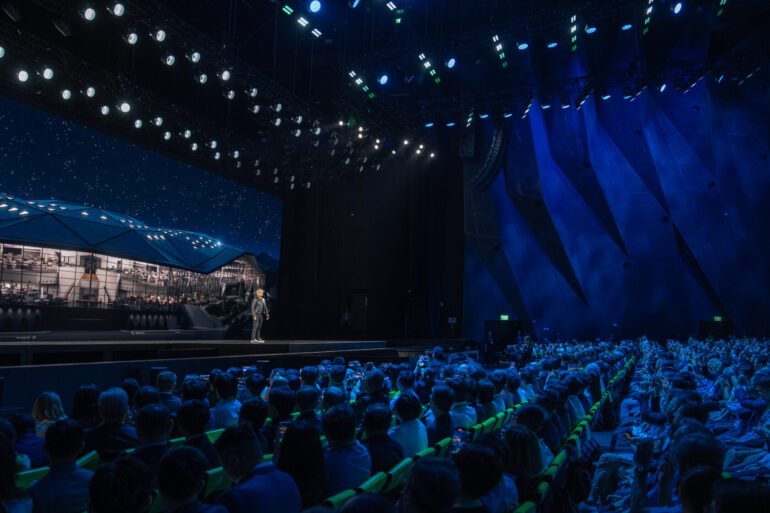
NVIDIA Corp. CEO Jensen Huang returned to his native Taiwan on Monday to unleash the company’s latest suite of artificial intelligence (AI) hardware and software, headlined by the forthcoming GB300 systems, a DGX Spark AI workstation, and NVLink Fusion, a new interconnect technology open to other chip makers.
“When new markets have to be created, they have to be created starting here, at the center of the computer ecosystem,” Huang said in a keynote speech at the COMPUTEX 2025 show, underscoring Taiwan’s status in the worldwide tech supply chain.
The globe-trotting Huang also revealed that NVIDIA and longstanding partner Foxconn are now working with the Taiwan government to build an AI factory supercomputer that will deliver state-of-the-art NVIDIA Blackwell infrastructure to researchers, startups and industries that include TSMC. “Having a world-class AI infrastructure here in Taiwan is really important,” Huang said.
The next-generation GB300 AI systems highlighted NVIDIA’s efforts to fuse GPUs and CPUs into a connected design to allow for faster training and inference of AI models. The chips, which should be available in the third quarter, would succeed Grace Blackwell, the current flagship AI chips being used by cloud giants Microsoft Corp. and Amazon.com Inc.
To that end, NVIDIA said it will now let other chipmakers adopt its proprietary NVLink technology through a variant called NVLink Fusion. The high-speed interconnect technology aims to break down traditional data center bottlenecks so that multiple processors and accelerators work together seamlessly to handle sophisticated AI workloads. NVLink Fusion will be available to Marvell Technology Inc., Qualcomm Inc., Fujitsu and MediaTek Inc., according to NVIDIA.
“This incredible body of work now becomes flexible and open for anybody to integrate into,” Huang said.
NVIDIA will also develop AI infrastructure for a large-scale supercomputing ecosystem in collaboration with Foxconn, Taiwan Semiconductor Manufacturing Co., and Taiwan’s National Science and Technology Council. “AI is now infrastructure, and this infrastructure, just like the internet, just like electricity, needs factories,” Huang said. “These factories are essentially what we build today.”
Huang’s 100-minute keynote included the launch of DGX Spark, a compact AI workstation targeted at researchers and startups that should be available in weeks. Additionally, he offered updates on the company’s roadmap that included the forthcoming Blackwell Ultra chips and future Rubin and Feynman processors, which are due by 2028. Those chips will support the industry’s pivot from building large foundational models to deploying AI applications at scale.
“There was a time when 90% of my presentations were about GPUs for gaming,” Huang said. “Today, NVIDIA is the AI computing company.”
Robotics also made a cameo appearance. The Isaac Groot platform and Newton engine demonstrated how robots learn real-world navigation and human-like actions via simulation. Huang said NVIDIA’s RTX Server Pro would support DeepSeek’s R1 model.
NVIDIA’s moves were necessary, analysts said, amid escalating competition from hyperscalers pursuing internal AI workloads.
“Jensen was more than clear in his delivery that he sees the urgency to protect the data center moat but also move to the next wave of opportunities at the edge, in the vehicle, on device, and in the private cloud and enterprise environment,” Daniel Newman, CEO of The Futurum Group, said in a post on social media platform X on Monday. “Now investors have to wrestle with the growing competitive pressure of the hyperscalers developing in-house AI hardware + software stacks for internal AI workloads. This will happen. It will impact total market share, but the overall market share will grow. The past few days the likes of Google and AWS have further committed to this. But Meta, OpenAI, Microsoft, etc. All going this route.”
NVIDIA’s full-court AI press kicked off what is expected to be the busiest tech conference week so far this year, with an overwhelming emphasis on AI. Google, Microsoft Corp., IBM’s Red Hat Inc., Dell Inc., SAP and others have all scheduled major press events this week.
For Huang, the news from Taiwan — an increasingly hot spot in the AI war between the U.S. and China — was just another global stop on a bruising tour to promote his company and the technology. After making the rounds at tech shows in the U.S. in recent weeks, Huang and a passel of tech executives last week joined President Donald Trump at a press conference in Riyadh to announce the shipment of 18,000 Blackwell chips to Saudi Arabia.

